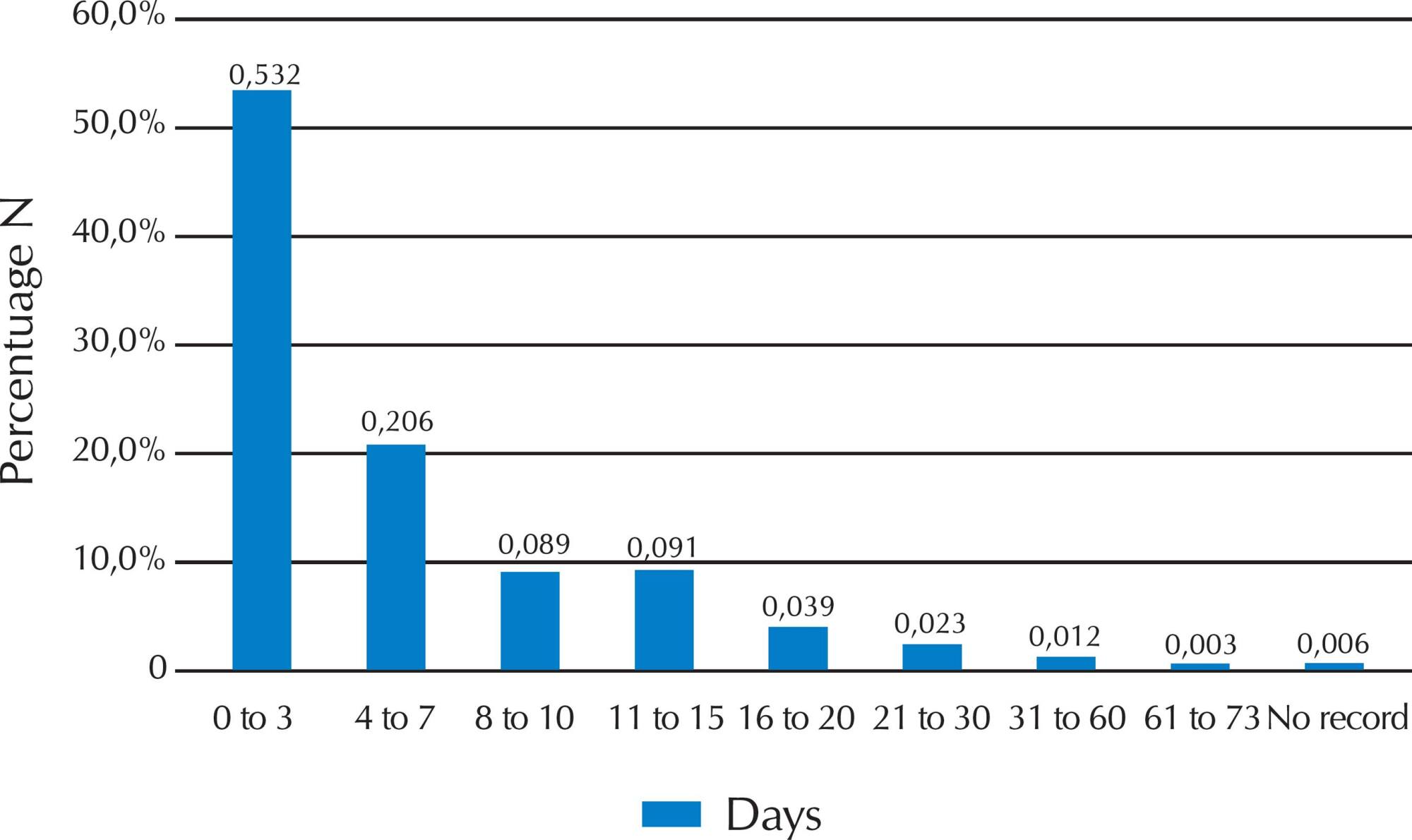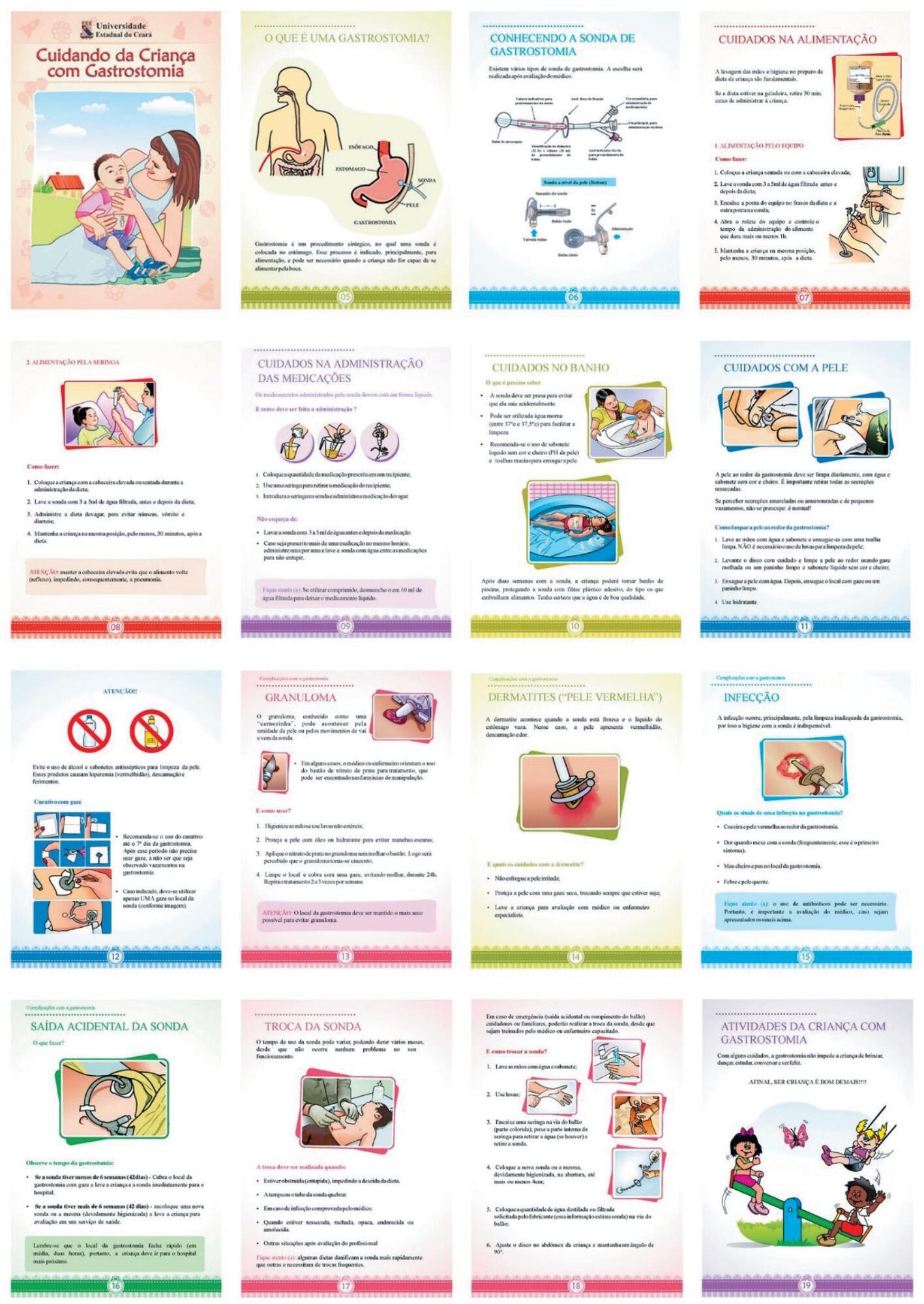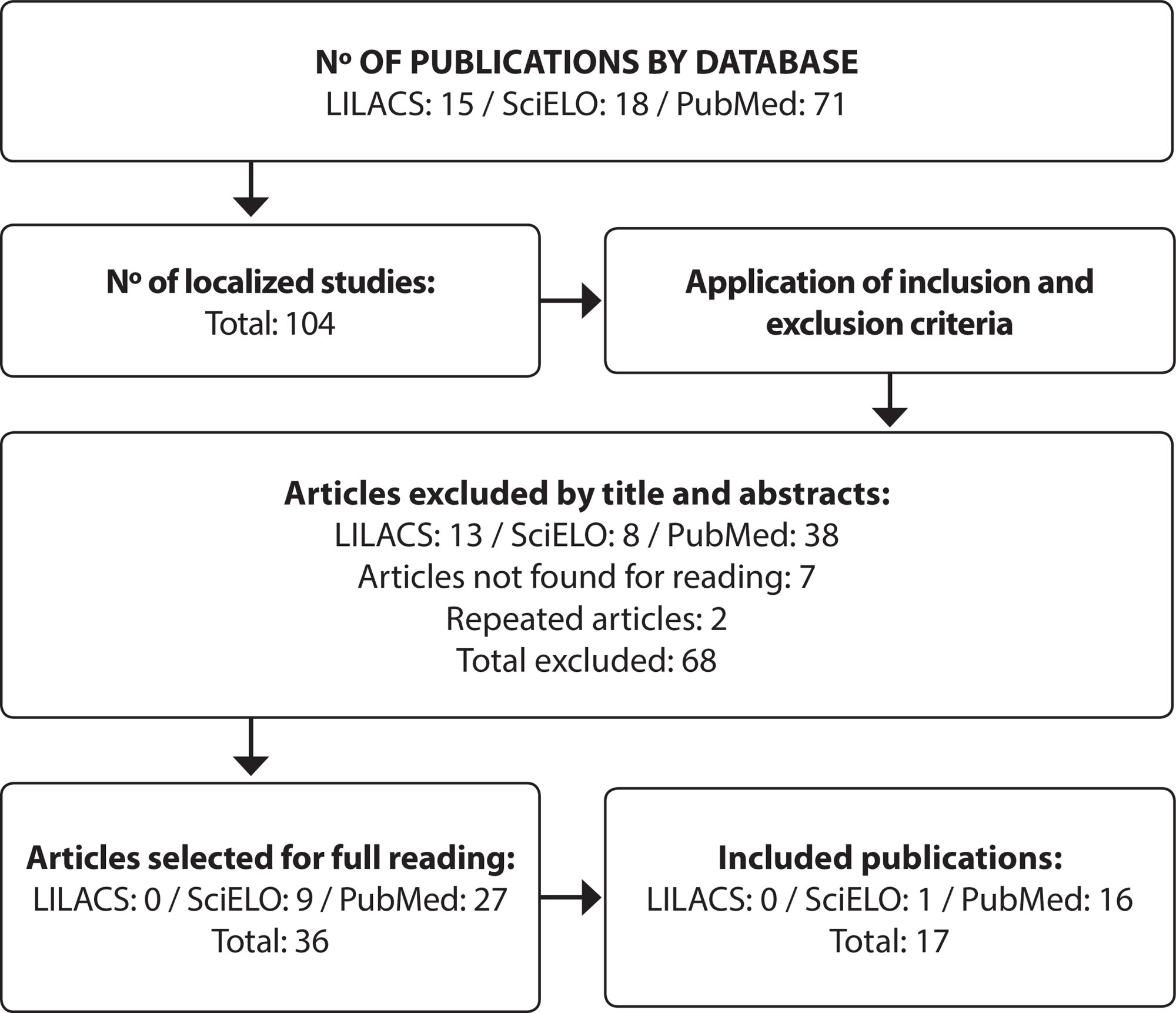-
RESEARCH
Quality of life assessment for health promotion groups
Revista Brasileira de Enfermagem. 2016;69(2):242-249
01-01-2016
Abstract
RESEARCHQuality of life assessment for health promotion groups
Revista Brasileira de Enfermagem. 2016;69(2):242-249
01-01-2016DOI 10.1590/0034-7167.2016690206i
Views0See moreABSTRACT
Objective:
to analyze the use of quality of life assessment (QOL) as a strategy to evaluate the work with health promotion groups in the community.
Method:
cross-sectional, descriptive and analytical study. Participants of two elderly groups (n=46) were individually interviewed to fill the sociodemographic instruments, WHOQOL-BREF and WHOQOL-OLD.
Results:
the participants were women with up to 79 years, who did not live with a partner, with up to four years of study, retired, with individual income of up to a minimum salary. The mean scores on the WHOQOL-BREF were higher on “Social Relations” and lower in the “Environment”. For the WHOQOL-OLD, the highest scores were achieved in facets “Social Participation” (G1) and “Past, Present and Future Activities” (G2), while “Death and Dying” facet obtained lower scores in both groups.
Conclusion:
the assessment of QOL appears to be useful in helping to identify the coordination aspects of life of elderly people that need to be better developed in groups.
-
RESEARCH
Transcultural adaptation and validation of the Brazilian version of Treatment Spirituality/Religiosity Scale
Revista Brasileira de Enfermagem. 2016;69(2):235-241
01-01-2016
Abstract
RESEARCHTranscultural adaptation and validation of the Brazilian version of Treatment Spirituality/Religiosity Scale
Revista Brasileira de Enfermagem. 2016;69(2):235-241
01-01-2016DOI 10.1590/0034-7167.2016690205i
Views0See moreABSTRACT
Objective:
to perform the translation and transcultural adaptation to Brazilian Portuguese, and analyze the psychometric properties of the instrument Treatment Spirituality/Religiosity Scale (TSRS).
Method:
the sample consisted of 188 nursing students of technical and higher education. The reliability analysis by test-retest was performed one month after the first application of the instrument. To measure the construct validation, a factorial analysis was carried out.
Results:
the Brazilian version of the TSRS consisted of 10 items, with two factors. The reliability by test-retest showed a Kappa coefficient ranging from 0.22 to 0.47, and a global internal consistency Cronbach’s alpha of 0.85.
Conclusion:
the Brazilian version of the TSRS showed satisfactory values of validity and internal consistency, being suitable for use in the national context.
-
RESEARCH
Epidemiological characteristics and causes of deaths in hospitalized patients under intensive care
Revista Brasileira de Enfermagem. 2016;69(2):229-234
01-01-2016
Abstract
RESEARCHEpidemiological characteristics and causes of deaths in hospitalized patients under intensive care
Revista Brasileira de Enfermagem. 2016;69(2):229-234
01-01-2016DOI 10.1590/0034-7167.2016690204i
Views0ABSTRACT
Objective:
to describe the epidemiological and sociodemographic characteristics of patients hospitalized in an ICU.
Method:
an epidemiological, descriptive and retrospective study. Population: 695 patients admitted from January to December 2011. The data collected were statistically analyzed with both absolute and relative frequency distribution.
Results:
61.6% of the patients are male, aged 40 to 69 years, and most of them came from the surgery rooms. The most frequent reason for admission was diseases of the circulatory system (23.3%). At discharge from the ICU, 72.4% of the patients were sent to other units of the same institution, 31.1% to the intermediate care unit, and 20.4% died, of which 24.6% from diseases of the circulatory system. The afternoon shift had 45.8% of the admissions and 53.3% of the discharges.
Conclusion:
the description of the sociodemographic and epidemiological features guides the planning of nursing actions, providing a better quality service.
Keywords:Critical CareDescriptive EpidemiologyIntensive Care UnitMorbidityMortality IndicatorsNursingSee more
-
RESEARCH
Hospital discharge of premature newborns: the father’s experience
Revista Brasileira de Enfermagem. 2016;69(2):221-228
01-01-2016
Abstract
RESEARCHHospital discharge of premature newborns: the father’s experience
Revista Brasileira de Enfermagem. 2016;69(2):221-228
01-01-2016DOI 10.1590/0034-7167.2016690203i
Views0See moreABSTRACT
Objective:
To describe the father’s experience with his premature child discharge of the Neonatal Intensive-Care Unit and to point out interventions to promote this experience.
Method:
Qualitative research with eight fathers, adopting the Symbolic Interactionism as theoretical reference and thematic narrative research as methodological frame.
Results:
The analysis of data has allowed us to describe the experience of the father from three thematic units: “fatherhood boundaries”, “high responsibility for the child” and “social network and support”.
Conclusion:
The father feels insecure with the idea of taking care of his child at home because of the lack of professional support and the initial contact with the child in the Neonatal Intensive-Care Unit.
-
RESEARCH
Nurses from the Mobile Emergency Service: profile and developed activities
Revista Brasileira de Enfermagem. 2016;69(2):213-220
01-01-2016
Abstract
RESEARCHNurses from the Mobile Emergency Service: profile and developed activities
Revista Brasileira de Enfermagem. 2016;69(2):213-220
01-01-2016DOI 10.1590/0034-7167.2016690202i
Views0See moreABSTRACT
Objective:
to characterize the profile and identify the activities developed by nurses from the Mobile Emergency Care Service of a state of southern Brazil.
Method:
an exploratory, descriptive study. Data were collected through a questionnaire with 63 nurses.
Results:
the profile showed a workforce predominantly female, young and having specialized training. The activities were organized in the dimensions of caring, managing and educating, verifying the predominance of the first one. Care actions involved multiple procedures, but the use of the Systematization of Nursing Care (SNC) was not mentioned in the development of care activities. Then, the managerial dimension with a predominance of bureaucratic activities was emphasized. Educational activities were less prominent.
Conclusion:
care actions are the focus of the activities of nurses, predominantly the prescribed institutional care without the use of instruments such as SNC that could contribute to the greater visibility of their professional work.
-
EDITORIAL
Desafios e imperativos de liderança na cooperação com a Organização Mundial da Saúde
Revista Brasileira de Enfermagem. 2016;69(2):207-208
01-01-2016
Abstract
EDITORIALDesafios e imperativos de liderança na cooperação com a Organização Mundial da Saúde
Revista Brasileira de Enfermagem. 2016;69(2):207-208
01-01-2016DOI 10.1590/0034-7167.2016690201i
Views0Quando uma instituição promove inovações estratégicas, é colocado em curso o rompimento com a tradição, provocando mudanças e, por consequência, alterando as expectativas e as perspectivas tanto dos seus clientes internos, quanto dos seus clientes externos.Os motores das inovações adotadas são acionados por uma visão ampliada dos fins da organização, alargando suas fronteiras em termos […]See more -
EDITORIAL
Challenges and leadership imperatives in cooperation with the World Health Organization
Revista Brasileira de Enfermagem. 2016;69(2):207-208
01-01-2016
Abstract
EDITORIALChallenges and leadership imperatives in cooperation with the World Health Organization
Revista Brasileira de Enfermagem. 2016;69(2):207-208
01-01-2016DOI 10.1590/0034-7167.2016690201i
Views0When an institution promotes strategic innovations, it starts the rupture with tradition, causing changes and, consequently, altering the expectations and prospects of both their internal clients, as their external clients.The engines of the adopted innovations are driven by a broader view of the organization’s purposes, expanding its borders in terms of breadth and depth, which […]See more -
ERRATUM
ERRATUM
Revista Brasileira de Enfermagem. 2016;69(1):206-206
01-01-2016
Abstract
ERRATUMERRATUM
Revista Brasileira de Enfermagem. 2016;69(1):206-206
01-01-2016DOI 10.1590/0034-7167.20166901e02
Views0In the article “Conceptions of mid-level nursing professionals facing those with a chemical dependency”, with the number of DOI: 10.1590/0034-7167.2015680610i, published in the journal Revista Brasileira de Enfermagem, v68(6):755-60, page 760 that read:“8. Vargas D, Soares J. Knowledge and attitudes of nurses towards alcohol and related problems: the impact of an educational intervention. Rev Esc […]See more
-
ORIGINAL ARTICLE
Validation of educational booklet: an educational technology in dengue prevention
Revista Brasileira de Enfermagem. 2019;72(5):1318-1325
09-16-2019
Abstract
ORIGINAL ARTICLEValidation of educational booklet: an educational technology in dengue prevention
Revista Brasileira de Enfermagem. 2019;72(5):1318-1325
09-16-2019DOI 10.1590/0034-7167-2018-0771
Views0See moreABSTRACT
Objective:
to validate a booklet on dengue prevention in order to make it an educational technology to be used with the population.
Method:
methodological study, carried out with two groups of judges specialized in health and other areas. For data analysis, the calculation of Content Validity Index was carried out.
Results:
the booklet, in general, was considered valid by the expert judges, since it obtained an overall CVI of 70%. However, it has undergone a textual and aesthetic re-elaboration. The changes were based on the substitution of expressions, phrases, information additions and language adequacy. The illustrations were redone, adding clarity, expressiveness, movement, interaction and contextualization.
Conclusion:
the booklet is valid to be used for the population, with the purpose of informing, in a playful way, the forms of prevention and combat to mosquito transmitting dengue.

-
REVIEW
Mental health of healthcare professionals in China during the new coronavirus pandemic: an integrative review
Revista Brasileira de Enfermagem. 2020;73:e20200338
09-18-2020
Abstract
REVIEWMental health of healthcare professionals in China during the new coronavirus pandemic: an integrative review
Revista Brasileira de Enfermagem. 2020;73:e20200338
09-18-2020DOI 10.1590/0034-7167-2020-0338
Views0See moreABSTRACT
Objective:
to identify publishing related to the mental health of health professionals working in the front line of the COVID-19 pandemic.
Methods:
an integrative review that included primary articles indexed in the Latin American and Caribbean Literature in Health Sciences, Medical Literature Analysis and Retrieval System Online, Cumulative Index to Nursing and Allied Health Literature, Scopus, Embase, Web of Science, Science Direct databases and US National Library of Medicine databases. The result analysis was performed descriptively, in four analytical categories.
Results:
The publishing involved aspects related to insufficient personal protective equipment, feelings of fear and stigma, the need for psychological and psychiatric support and the possibility of post-outbreak mental disorders.
Conclusion:
All mentioned aspects have a direct impact on the mental health of professionals, demanding the creation of strategies that minimize the emotional burnout of workers, considering that each country and culture reacts differently to the disease.

-
ORIGINAL ARTICLE
Religious/spiritual coping and level of hope in patients with cancer in chemotherapy
Revista Brasileira de Enfermagem. 2019;72(3):640-645
06-27-2019
Abstract
ORIGINAL ARTICLEReligious/spiritual coping and level of hope in patients with cancer in chemotherapy
Revista Brasileira de Enfermagem. 2019;72(3):640-645
06-27-2019DOI 10.1590/0034-7167-2018-0358
Views0See moreABSTRACT
Aim:
To demonstrate the relationship between religious/spiritual coping and hope in cancer patients undergoing chemotherapy.
Method:
This is a cross-sectional, descriptive study with a quantitative approach performed in a reference outpatient clinic in Caruaru, PE, between August and October 2017. A total of 82 cancer patients undergoing chemotherapy were included in the study, using the brief religious/spiritual coping scale (RCOPE-Brief) and the Herth Hope Scale (HHS).
Results:
The sample presented mean positive RCOPE scores (3.03 ± 0.41) and the level of hope was considered high (42.7 points ± 3.67). Patients who had a high RCOPE score were found to have a higher mean of Herth’s level of hope (44.12 points).
Conclusion:
This study becomes relevant to nursing professionals by encouraging care that takes into account the patient’s spiritual dimension in order to stimulate positive mechanisms of religious coping and, consequently, raise the levels of hope.
-
ORIGINAL ARTICLE
Construction and validation of an educational booklet on care for children with gastrostomy
Revista Brasileira de Enfermagem. 2020;73(3):e20190108
04-22-2020
Abstract
ORIGINAL ARTICLEConstruction and validation of an educational booklet on care for children with gastrostomy
Revista Brasileira de Enfermagem. 2020;73(3):e20190108
04-22-2020DOI 10.1590/0034-7167-2019-0108
Views0See moreABSTRACT
Objectives:
to describe the process of construction and validation of an educational booklet on care for children with gastrostomy, directed to caregivers.
Methods:
a methodological study developed in five stages: bibliographic survey; situational diagnosis; illustration, layout, design and text construction; expert validation and Flesch-Kincaid Readability calculation; validation with the target audience. Content Validity Index and Suitability Assessment of Materials were applied for expert analysis.
Results:
the Content Validity Index obtained overall score of 0.93. In the Suitability Assessment of Materials score, the booklet scored 85.2%. It presented a satisfactory readability percentage, with an overall score of 72%, and was consistent with caregivers’ assessment in the validation with the target audience, considering the explanatory technology, important and adequate.
Conclusions:
the developed educational booklet was considered valid for use by caregivers, thus contributing to the maintenance of best practices in care for children with gastrostomy.

-
REVIEW
Hospital transition care for the elderly: an integrative review
Revista Brasileira de Enfermagem. 2019;72:294-301
12-05-2019
Abstract
REVIEWHospital transition care for the elderly: an integrative review
Revista Brasileira de Enfermagem. 2019;72:294-301
12-05-2019DOI 10.1590/0034-7167-2018-0286
Views0See moreABSTRACT
Objective:
to identify evidence of scientific production on hospital transition care provided to the elderly.
Method:
an integrative review, with publications search in the MEDLINE, PubMed, LILACS, BDENF, Index Psychology and SciELO databases, with keywords and Mesh terms: elderly, hospitalization, patient discharge, health of the elderly, and transitional care, between 2013 and 2017 in English, Portuguese and Spanish. The 14 selected articles analysis was carried out through exploratory and critical reading of titles, abstracts and results of the researches.
Results:
transitional care can prevent re-hospitalizations as they enable rehabilitation, promotion and cure of illnesses in the elderly.
Final considerations:
transitional care implies the improvement of the quality of life of the elderly person, requiring skilled health professionals who involve the family through accessible communication.

-
ORIGINAL ARTICLE
Development of an appearance validity instrument for educational technology in health
Revista Brasileira de Enfermagem. 2020;73:e20190559
12-21-2020
Abstract
ORIGINAL ARTICLEDevelopment of an appearance validity instrument for educational technology in health
Revista Brasileira de Enfermagem. 2020;73:e20190559
12-21-2020DOI 10.1590/0034-7167-2019-0559
Views0ABSTRACT
Objectives:
to develop and evaluate the convergence of the instrument for the appearance validity of educational technologies in health.
Methods:
methodological study conducted in two steps. In step 1, the instrument items were developed, with subsequent content validity by nine specialists in the development of educational technologies in health. In step 2, the convergent validity between another instrument and the appearance instrument was performed. Correlation results above r> 0.3 and p <0.05 were considered as plausible convergent validity.
Results:
the ten items of the initial version of the appearance instrument were submitted to content validity that resulted in a final version with 12 items (Content Validity Index = 0.93). The correlation indexes were strong with the objective and appearance domains; moderate with motivation, organization and total; and weak with writing style.
Conclusions:
the appearance instrument demonstrated content validity and convergent validity, in addition to a strong correlation with the other instrument.
Keywords:Educational TechnologyHealth EducationMethodological Research in NursingTechnological DevelopmentValidation StudiesSee more -
ORIGINAL ARTICLE
Burnout among nursing students: predictors and association with empathy and self-efficacy
Revista Brasileira de Enfermagem. 2020;73(1):e20180280
02-10-2020
Abstract
ORIGINAL ARTICLEBurnout among nursing students: predictors and association with empathy and self-efficacy
Revista Brasileira de Enfermagem. 2020;73(1):e20180280
02-10-2020DOI 10.1590/0034-7167-2018-0280
Views0See moreABSTRACT
Objective:
to analyze burnout, its predictors and association with empathy and self-efficacy among nursing students.
Method:
cross-sectional analytical study with 284 students from five state universities in the state of Parana, Brazil. The instruments applied were: social and academic questionnaire, Maslach Burnout Inventory, Interpersonal Reactivity Index and Occupational Self-Efficacy Scale (Short Form). Spearman’s correlation and univariate and multivariate logistic analysis were used.
Results:
6.0% of the students presented high burnout, 36.3% presented high emotional exhaustion, 37.7% presented high depersonalization and 28.2% presented low personal accomplishment. The burnout predictors were: absence of physical activity; weekly workload >24 hours; low empathic concern. There were negative correlations between empathy (empathic concern and perspective taking) and depersonalization; self-efficacy and emotional exhaustion; and positive correlations between personal accomplishment and empathy and self-efficacy.
Conclusion:
Personal factors and an academic variable were burnout predictors among nursing students. The correlations suggest that self-efficacy and empathy can prevent burnout.
-
REVIEW
Positive aspects of authentic leadership in nursing work: integrative review
Revista Brasileira de Enfermagem. 2020;73(6):e20190118
08-07-2020
Abstract
REVIEWPositive aspects of authentic leadership in nursing work: integrative review
Revista Brasileira de Enfermagem. 2020;73(6):e20190118
08-07-2020DOI 10.1590/0034-7167-2019-0118
Views0See moreABSTRACT
Objective:
To identify and analyze the existing scientific production on the positive aspects of authentic leadership in the nurse’s work process.
Method:
This is an integrative literature review. The databases used were Scientific Electronic Library Online; Latin American and Caribbean Literature on Health Sciences; and National Library of Medicine – National Institutes of Health.
Results:
In this study, 17 articles were selected for analysis; 1 study (6%) was published in a national journal, and 16 (94%) were international studies. Of the 17 (100%) articles studied, 11 (65%) were developed in Canada. The hospital environment was present in the 17 (100%) articles.
Final considerations:
Authentic leadership has several positive aspects that significantly influence the nurse’s work process, such as engagement and job satisfaction, retention of new nurses, organizational commitment, among others.

Search
Search in:
Nuvem de Tags
Aged (144) Atenção Primária à Saúde (239) COVID-19 (104) Cuidados de Enfermagem (269) Educação em Enfermagem (151) Educação em Saúde (139) Enfermagem (930) Estudos de Validação (131) Health Education (144) Idoso (208) Mental Health (149) Nursing (987) Nursing Care (306) Patient Safety (151) Primary Health Care (284) Qualidade de Vida (104) Quality of Life (106) Saúde Mental (145) Segurança do Paciente (150) Validation Studies (108)



